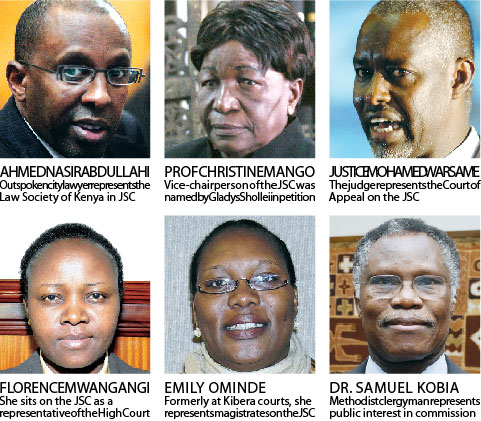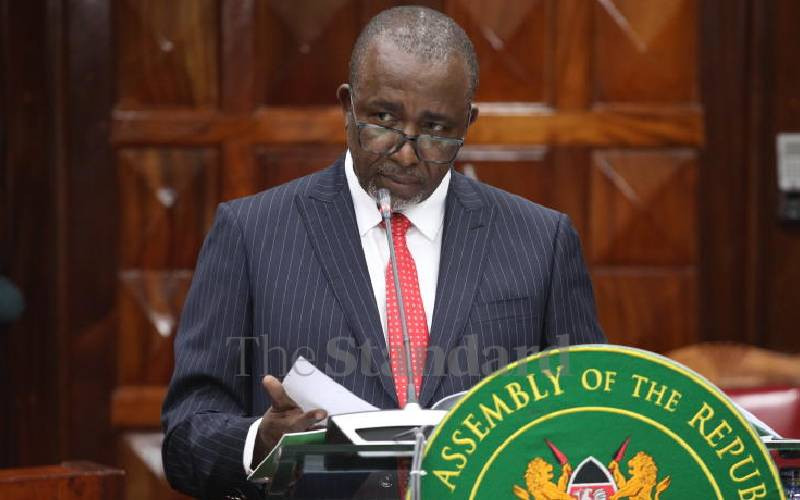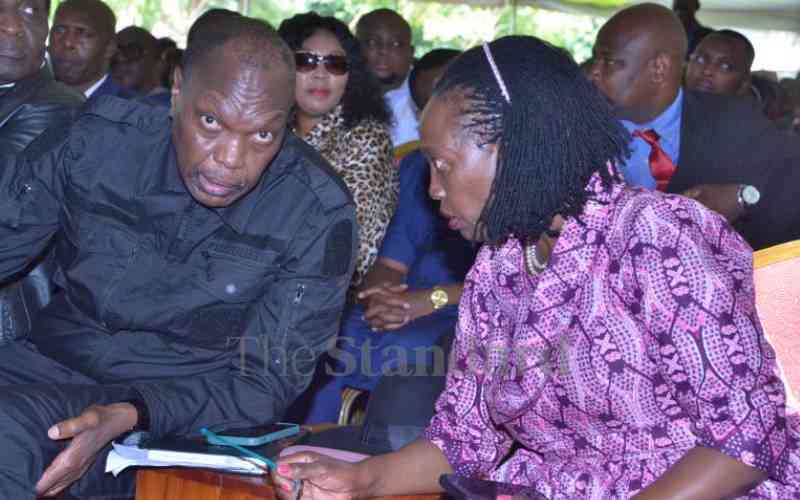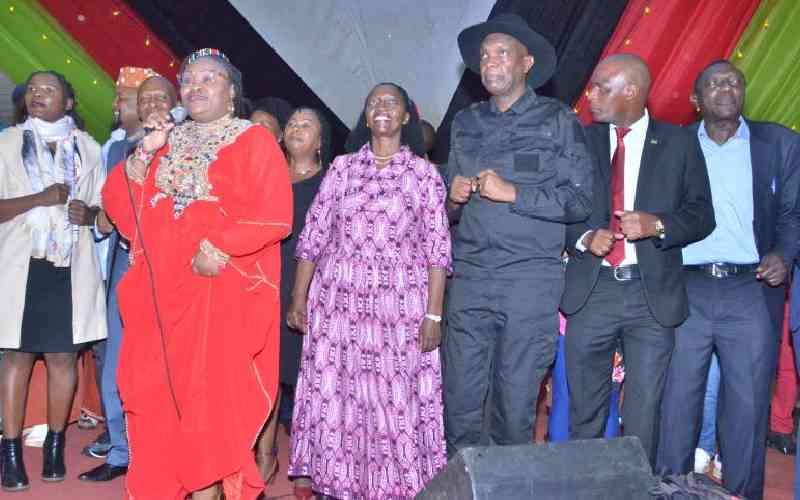 |
|
Documents reveal how commissioners get Sh80,000 per session in addition to drawing more from foreign trips. |
By KIPCHUMBA SOME
Members of the Judicial Service Commission are drawing millions of shillings monthly in sitting and travel allowances, documents seen by The Standard on Saturday reveal.
The commissioners earn Sh80,000 per sitting, meaning that a commissioner could easily earn Sh1 million in allowances within a month.
The JSC calendar indicates that the Commission had 14 engagements lined up in the month of May only, some of them running to up to five days. In that month the Commission had a breakfast meeting with the Inspector General of
Police David Kimaiyo and a consultative meeting with the Elders of Restorative Justice at the Intercontinental Hotel.
Every meeting, however brief, draws the same amount of allowances. Between May and August, the Commissioners also made trips abroad to Canada, USA, Cambodia, Sierra Leone and Tanzania.
The JSC has had a total of 467 sittings since 2011; 70 full commission meetings, 37 finance committee meeting, 61 human resource meetings, 95 ad hoc meetings and it has sat 204 times to conduct interviews.
The result of these many meetings and travels, within and outside the country, has been a drain on the lean financial resources of the Judiciary, especially at a time when judges in some parts of the country are holding court sessions under trees.
For example, Commissioner Christine Mango drew Sh4,960,000 in sitting allowances in six months from January to July. She has earned more than Sh17,488,000 since joining the Commission two years ago.
Other top earners include Commissioner Florence Mwangangi who earned Sh4,440,000, in the first six months of this year. In total she has earned more than Sh18,216,000 over the past two years.
Supreme Court judge Smokin Wanjala earned Sh4,480,000 in the first six months of this year while Rev Samuel Kobia earned Sh3,520,000 over the same period.
Chief Justice Dr Willy Mutunga earned Sh1,760,000 while Chief Registrar of the Judiciary Gladys Shollei earned Sh2,880,000 in the same period.
Number of meetings
A proposal by Mrs Shollei to cap the number of meetings to five or at Sh400,000 per month as a cost-cutting measure was rejected by the Commission.
We have reliably learnt that one of the Commissioners was forced to reimburse some of the money she had claimed for flight and hotel charges, which she was not entitled to. The commissioner was claiming the reimbursements yet she lives in Nairobi. The same commissioner had asked the Judiciary for a house loan which was turned down.
Stay informed. Subscribe to our newsletter
This information has come to light following an ongoing supremacy battle pitting Chief Justice Mutunga and the JSC against Chief Registrar Mrs Gladys Shollei.
It has emerged that the CJ has given his personal blessings to a 31-point plot conceived by four of his staff to kick out Mrs Shollei by October 1 claiming that she has become too powerful.
The plot was devised by Mr Duncan Okello, Prof Joel Ngugi, Mr Dennis Kabaara and Mr Kwamchetsi Makokha, who constitute a “War Council” of which the CJ is the head.
Mr Okello is the Chief of Staff in Mr Mutunga’s office while Prof Ngugi is the head of Judiciary Transformation Secretariat and the director of the Judiciary Training Institute.
Mr Kabaara is a financial analyst in the same office while Mr Makokha, a columnist in a leading local publication, is currently engaged as a communications consultant at the Office of the CJ.
The group believes that the CJ has failed to assert himself as the head of Judiciary thus allowing Mrs Shollei to eclipse him hence the need to kick her out.
“I would like to indulge you as friend and mentor on this one, but your attempts to be “nice” to Gladys is hurting us and our overall objectives. You must rise to the occasion and become the CJ,” wrote Prof Ngugi to the CJ in July.
Inability to take action
“I am now in South Sudan and we are all lamenting a lame duck CJ here. Everybody is frustrated by his inability to take action. We need to go down that route,” wrote Prof Ngugi to the other three alleged plotters on July 28, 2013 at 1:44 am.
Chief Justice Mutunga alluded to the excessive expenditure in the Judiciary in an e-mail to members of the “War Council” who were crafting for him a statement to read to the public about Mrs Shollei’s suspension by JSC.
“I have been told that some judges may be exposed in the inquiry and they need to be protected. This inquiry is not about that at all. The CRJ will expose the failure to pay monies owed to the Judiciary by some judges, illegal advances, and perhaps blame some of her colleagues in the office.
“For me this crisis means that cultural transformation of the Judiciary can take us to hell or on a trajectory to meaningful judicial transformation.
“The former will mean I must consider leaving the Judiciary while the latter gives me great opportunity to carry out changes,” he said in an e-mail to the four staff members on September 2, 2013 at 1:38 am.
One of the strategies put forward by Mr Mutunga’s kitchen cabinet on taming Mrs Shollei, was to consider forfeiting his allowances as part of a public charm offensive.
Number 28 of the plan, which advices the CJ to lead by example states: “Can the CJ consider to no longer receive his sitting allowances at JSC even though he is entitled to it? He will be demonstrating to the rest of the Judiciary that the JSC is not about collecting money but about leadership and dealing a severe blow to the culture of sitting allowances in the Judiciary.”
In response to our article yesterday, Mr Mutunga said his e-mail and Twitter accounts are routinely hacked by criminals, in a press statement sent to the media yesterday on his behalf by Mr Makohka.
“In the past, reports have been made to the National Intelligence Service about people hacking into the Chief Justice’s Twitter account; and his e-mail account has similarly been hacked in the past,” said the statement.
The statement, however, did not question the veracity of the contents of the trove of e-mail correspondence between the CJ and his “War Council” which The Standard on Saturday has seen.
For example, the statement did not speak about the 31-point strategy approved by the CJ whose ultimate aim is the removal of Mrs Shollei by hook or crook.
Move to court
Mrs Shollei has meanwhile has vowed to move to court to stop the JSC from investigating her saying the charges against are framed and the outcome pre-determined.
She demanded a public inquiry against the charges that the JSC has commenced against her be carried out by the Ethics and Anti-Corruption Commission, the Public Procurement Oversight Authority and the Auditor General.
As part of the plot against Mrs Shollei, the CJ met with Court of Appeal judges from Nairobi on Thursday evening in his office as part of a strategy to win them over.
We could not establish the agenda but The Standard on Saturday has seen e-mail correspondence by the “War Council” pondering on whether the CJ should issue a statement over his meeting with the judges.
“I am of the view that we shouldn’t ask the media to come until we are sure we shall secure the deal. If they report disagreement, TOPS (Thirty One-Point Strategy) momentum gets interrupted-at least in the public domain. What sayeth you?” reads the email from Mr Okello.
vindictive and unfair
The e-mails in our possession go way back before the efforts to remove Mrs Shollei began and some of them reveal tensions between top officials in the Judiciary.
For example, in an email on June 13, 2013 at 9:20 am, Chief Justice Mutunga told Mrs Shollei that Justice Mohammed Warsame is “into power games after coming to JSC.”
This was in relation to a decision he the CJ had made to allocate a Prado to Court of Appeal judge Agnes Murgor over Justice Warsame. “First it is a trap for both Judge Murgor and Warsame, particularly the latter.”
“Although Warsame did not dare attack you directly in my presence it is clear from the conversation he wanted me to see you as vindictive and unfair towards some judges.”
 The Standard Group Plc is a
multi-media organization with investments in media platforms spanning newspaper
print operations, television, radio broadcasting, digital and online services. The
Standard Group is recognized as a leading multi-media house in Kenya with a key
influence in matters of national and international interest.
The Standard Group Plc is a
multi-media organization with investments in media platforms spanning newspaper
print operations, television, radio broadcasting, digital and online services. The
Standard Group is recognized as a leading multi-media house in Kenya with a key
influence in matters of national and international interest.
 The Standard Group Plc is a
multi-media organization with investments in media platforms spanning newspaper
print operations, television, radio broadcasting, digital and online services. The
Standard Group is recognized as a leading multi-media house in Kenya with a key
influence in matters of national and international interest.
The Standard Group Plc is a
multi-media organization with investments in media platforms spanning newspaper
print operations, television, radio broadcasting, digital and online services. The
Standard Group is recognized as a leading multi-media house in Kenya with a key
influence in matters of national and international interest.






